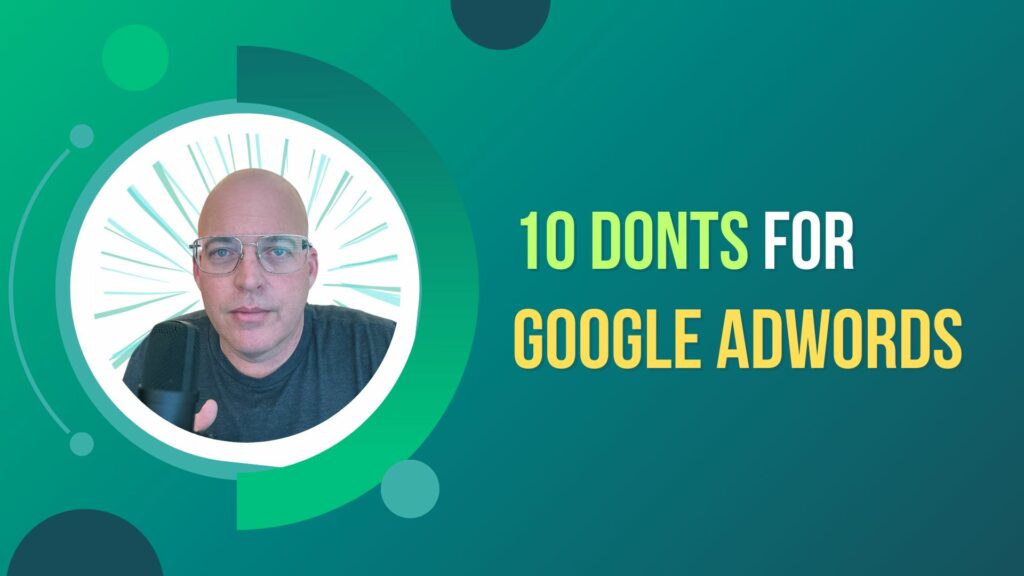Google AdWords, now known as Google Ads, has become an indispensable tool in the arsenal of digital marketers aiming to drive targeted traffic, generate leads, and achieve high ROI. As a platform enabling businesses to place ads in Google search results, among other Google properties and partner websites, Google Ads can be exceptionally rewarding when used correctly. However, the platform’s multifaceted nature also poses various challenges and pitfalls that can significantly undermine its efficacy. This is a roadmap to help identify donts for Google adwords, maximizing your campaign’s performance and overall success.

Don’t Ignore Keyword Research
Ignoring keyword research in a Google Ads campaign is akin to sailing a ship without a compass; you may move, but you’ll likely drift off course. Keyword research provides the foundation for your campaign, helping you understand what potential customers are searching for so you can target your ads effectively. Failing to invest time in this crucial step often leads to poorly targeted ads, resulting in a wasted budget on irrelevant clicks and a significantly lower return on investment.
Don’t Set and Forget Your Campaigns
Treating your Google Ads campaigns as a “set and forget” endeavor is comparable to planting a garden and never watering it. While it may look fine initially, neglect will lead to deterioration over time. Regularly monitoring and updating your campaigns are necessary for adapting to market changes, consumer behavior, and the competitive landscape. Failure to do so contributes to declining performance metrics, such as click-through rates and conversions, and leaves you blind to emerging opportunities that could amplify your results. Therefore, inactive management can culminate in poor performance and missed growth prospects.

Don’t Overlook Negative Keywords
Neglecting to utilize negative keywords in your Google Ads campaign is like leaving your front door open and inviting everyone in, regardless of their interest in what you’re offering. Negative keywords help to exclude search queries that are not relevant to your business, thereby improving the quality of traffic directed to your website. When overlooked, you risk attracting unqualified clicks that fail to convert and unnecessarily consume your budget. By not taking advantage of this feature, you essentially increase costs while diluting the effectiveness of your campaign.
Don’t Underestimate Ad Extensions
Ignoring ad extensions in your Google Ads campaign is much like buying a top-of-the-line smartphone and only using it for voice calls; you miss out on many additional features designed to enhance your experience. Ad extensions allow you to provide extra information, such as links, phone numbers, and business locations within your ad. This makes your ad more comprehensive, informative, and click-worthy. When you underestimate or disregard the use of ad extensions, you forfeit a valuable chance to make your ad stand out, thereby missing opportunities for enhanced visibility and potentially better click-through rates.

Don’t Ignore Mobile Users
Failing to optimize for mobile users in your Google Ads campaign is like opening a retail store but ignoring foot traffic, a significant source of potential customers. With the ever-increasing prevalence of smartphones, a substantial chunk of search queries now originate from mobile devices. Mobile optimization ensures that your ads and landing pages are designed with these users in mind, offering a seamless experience that encourages engagement and conversion. Ignoring this growing demographic can result in lower reach, as your ads may not display or function well on mobile devices. It could lead to decreased conversion rates due to a subpar user experience.
Don’t Overcomplicate Your Landing Pages
Overcomplicating your landing pages is akin to writing a novel when a short story will do; you risk losing the audience’s interest by inundating them with unnecessary details. An effective landing page should be streamlined, focusing on key elements like a clear call-to-action, succinct content, and visual cues that guide the visitor toward conversion. Excessive elements or complex designs can overwhelm visitors, leading them to abandon the page without taking the desired action. This results in lower conversion rates and a poor user experience, ultimately undermining the effectiveness of your Google Ads campaign.

Don’t Skip A/B Testing
Skipping A/B testing in your Google Ads campaign is similar to cooking a complex dish without tasting it; you won’t know what’s missing or what needs adjustment. A/B testing allows you to compare two ad or landing page versions to determine which performs better in metrics like click-through rates, conversion rates, and more. By forgoing this analytic tool, you miss the opportunity to fine-tune various aspects of your campaign for peak performance. This lack of data-driven refinement often leads to suboptimal results and the loss of valuable insights that could have been leveraged for future campaigns.
Don’t Blindly Follow Trends
Blindly following trends in Google Ads is similar to jumping on a moving train without knowing its destination; it’s risky and may not take you where you want to go. Trends in digital advertising can change rapidly, and what works for one business may not necessarily be effective for another. Adopting the latest tactics without proper evaluation or adaptation to your needs can result in a disjointed and ineffective campaign. This wastes your financial resources and can lead you down a path of strategies and techniques that do not align with your business goals or target audience, squandering time and opportunity.

Don’t Neglect Analytics
Neglecting analytics in your Google Ads campaign is like driving without a GPS; you won’t know if you’re on the right path or need to turn to reach your destination. Analytics tools offer invaluable insights into how well your campaign performs across metrics such as click-through rates, conversions, and ROI. These data points serve as a performance report card, enabling you to make informed decisions for tweaking or overhauling your campaign. If you overlook the power of analytics, you operate in a vacuum, making it difficult to ascertain what’s working and what’s not. This hampers your ability to make strategic adjustments, potentially leading to stagnation or a decline in campaign performance.
Don’t Underbudget
Underbudgeting for your Google Ads campaign is comparable to trying to fuel a jet with just a gallon of gas; you won’t get far. An adequate budget is required to compete effectively, especially in markets with high competition or costly keywords. Setting a budget that is too low limits your campaign’s reach and diminishes its potential for success. It restricts how often your ad can be shown, reducing opportunities for clicks and conversions. Ultimately, scrimping on your budget can stifle your campaign’s performance and limit its effectiveness, making it challenging to achieve your marketing objectives.
Avoid the Donts of Google Adwords
In navigating the complexities of Google Ads, avoiding the common pitfalls discussed—ranging from neglecting keyword research to underbudgeting—can significantly affect your campaign’s success. Just as a skilled carpenter wouldn’t ignore the quality of his tools or materials, savvy marketers should pay meticulous attention to each aspect of their Google Ads campaigns. By proactively avoiding these errors, you optimize your budget and set a course for higher ROI and overall campaign efficacy. The road to a successful Google Ads campaign is less daunting when you know what obstacles to sidestep.








